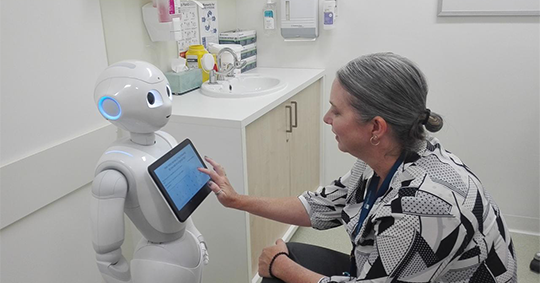Image: Photos Hobby from Unsplash
Robots are innovative creations, and they've come along way from where they first started. Robot Pepper is a prime example of just how much progress the robots field has made. Pepper is a humanoid robot that businesses can program to help with their operations.
From education to hospitality to health, Pepper assists everyday needs and tasks. It's a creation from Softbank Robots that has only been around since 2015 but has been making big waves ever since. Transforming the way places like hospitals, hotels and schools run is now a standard part of what makes Pepper the robot so unique.
1. Education
Education is a vast industry. It spans from elementary school through grad school, for people of all ages and fields of study of all kinds. Pepper Robot is a beneficial integration for any grade level. It helps with both the teaching and learning sides of things.
For educators, they get to incorporate a new learning style into their teaching method. Pepper can read process languages and certain emotions. If a student is struggling, the robot can answer questions or provide guidance. Then, educators can make sure everyone in the class gets the attention they need.
Students get to have a hands-on approach. For research or for learning, Pepper is the assistant students need. It's invaluable for STEM majors since it requires programming of its own kind. Its programming branches out into the arts and reading, too. Pepper can help students of any age succeed.
Notably, Palomar College integrated Pepper in a unique way. On campus, Pepper serves to answer any questions that students and visitors may have about the school, like directions.
2. Hospitality
Another broad industry is hospitality. From hotels to restaurants, hospitality looks different across the globe, which is why Pepper is integral. By 2030, about 70% of companies will be using some form of artificial intelligence (AI) technology — which includes robotics. Pepper is guiding the hospitality industry to become more globally connected and expansive since it speaks 15 different languages.
Its autonomous nature then makes it ideal to have in hospitality businesses like restaurants and hotels. For instance, Robot Pepper founder Softbank opened a cafe in Tokyo with Pepper robots working as the staff. They serve customers and take care of things in the store, just like humans would.
Hotels and museums are following this trend, too. The Smithsonian has been using Pepper robots as a source of information and engagement in the museum. In galleries and exhibits of all kinds, visitors can ask Pepper questions or engage with it since the robot interprets body language to properly respond.
In hotels, guests can check in with Pepper and get their room information. Then, the robot can call a human to help with bags. Guests can later call Pepper for any needs, which it can then handle or hand off to a person.
3. Health
Health and wellness are critical — arguably more of a focus than ever with the COVID-19 pandemic still a prominent issue. With the global virus comes strict rules for slowing the spread — wearing masks, checking temperatures and maintaining social distance.
Luckily, Pepper can help here, too. The robot, as innovative as it is, can have the right programming and tools to monitor health. For instance, Pepper can use thermal imaging to check if people have fevers without making contact. It can also clean and disinfect!
The robot can track how well people are social distancing. From the data that Pepper reports, businesses can then contact trace and alert people if they came near a COVID-19 carrier.
Japan implemented Pepper in hotels to look after those who contracted the virus. It helped patients monitor their vitals and gave them reminders to take it easy. In hospitals, the robot enforces social distancing and provides tips on wearing masks.
Essentially, Pepper is an all-around tool that health workers and businesses can use to any degree. Even after the pandemic passes, you're likely to see Pepper stick around in health facilities to help patients.
Changing the Game
With Pepper becoming and integral part of these three industries, robots are taking what being an assistant means to new levels. Pepper's capabilities and efficiency make it the perfect tool to bring societies to the future of robots.
And how much costs Pepper? The price starts at $30,000
Discover more About Pepper with RobotLAB!

Shannon Flynn
Managing Editor - shannon@rehack.com



